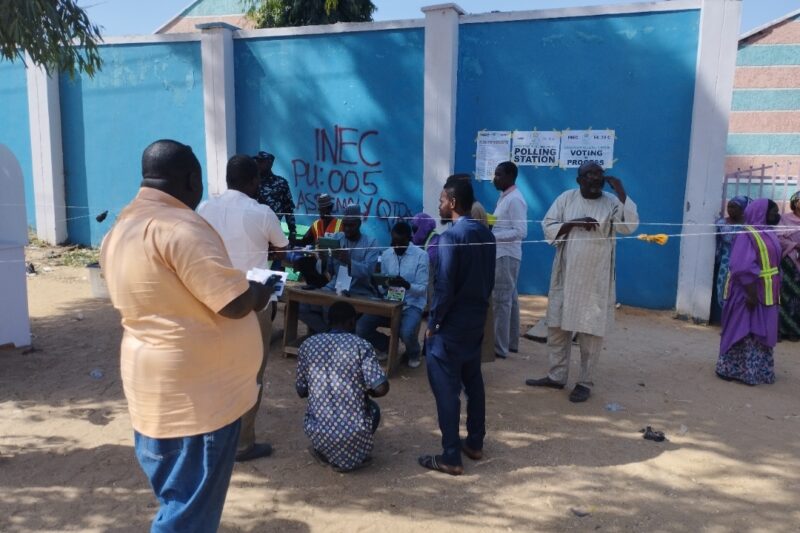Nigeria’s general elections proceed peacefully, despite attack in Gwoza, Borno State, where five people were wounded, and the theft of Bimodal Voter Accreditation System machines in some voting areas.
Nigeria’s Independent National Electoral Commission (INEC) chairman, Mahmood Yakubu, has confirmed that the results of Saturday’s general elections will start being collated at noon on Sunday.
It was not known, immediately, how long it would take to get the final results. But citizens of Africa’s most populous nation – and the global community – are eager to know who will be the country’s next president.
Excited citizens began queueing at the 176,606 polling stations across Nigeria as early as 6.30am to ensure they would not miss the opportunity to vote.
The voting – supposed to run from 8.30am to 2.30pm – was mostly peaceful and well organised, although there were instances of polling stations opening much later than planned and there were reports of insurgents shooting at voters in Gwoza, where five people were wounded.
Some Bimodal Voter Accreditation System (BVAS) machines had also been stolen.
However, for the most part, citizens said the voting had gone smoothly and peacefully.
Citizens happily complied with the order of restricted movement and the roads were clear with no vehicles in sight. Security operatives were on patrol at all polling stations to ensure peaceful and rancour-free voting.
RNI reporters were on site at various polling stations across the country to observe and monitor the voting process.
USE OF BVAS IN THE ELECTIONS
Millions of citizens headed to the polls to elect the next president, vice-president and National Assembly members on Saturday.
For the first time, INEC introduced the BVAS, considered by many to be the unsung hero to ensure peaceful elections. INEC said the BVAS was a significant technological upgrade from the Smart Card Reader, which was used in the 2015 and 2019 general elections and which had proved susceptible to compromise by election riggers.
But it wasn’t all smooth sailing at some polling stations in the country as the BVAS machines developed glitches and failed, leading to complaints by electorates that they were rejected as credible voters. They believed they were being disenfranchised and stopped from exercising their right to vote.
Before the introduction of BVAS machines, voters were made to stand in queues for hours to get accredited. They were sent home briefly and then had to stand in long lines again to be fingerprinted and only then were they allowed to cast their votes. This resulted in cumbersome electoral processes and much wasted time.
Nyesom Wike, the governor of Rivers State governor, was one of the people who expressed disappointment on Saturday when the BVAS machine at his polling unit failed to accredit him and his wife. Because of this, he called on INEC to extend the voting process until evening.
DID VOTING START IN TIME AT POLLING BOOTHS ACROSS THE COUNTRY?
Accreditation and voting was supposed to start at 8.30am and finish at 2.30pm. But at a few of the 176,606 polling stations across Nigeria voting started well after 8.30am. INEC said this was because of logistics problems and security challenges.
To make up for the late start, INEC said that all Nigerians who were in the queues before 2.30pm would be entitled to vote, even if it meant voting carried on into the evening.
At Baga town in the Kakuwa Local Government Area, INEC officials only arrived at the polling station at about 11am. They blamed the late start on fears of being attacked by insurgents.
Voters were not happy as they were concerned that they would not have enough time left to vote and would be disenfranchised.
Shugaba Ali Cross Kawowa, a resident of Baga town, told RNI that many voters had started gathering at the polling booth early in the morning.
“We had to wait until 11am before INEC officials arrived. By then many of us had almost given up hope that we would be able to vote. It was frustrating and many of us were worried. It was a relief when the officials arrived, although we were not sure everyone would get the chance to vote. Luckily INEC decided that as long as people were in the queue by 2.30pm, they would be able to vote even after the proper cut-off time.”
Hadiza Mohammed, a resident of the Jere Local Government Area, said: “I came to the polling booth early in the morning but the INEC officials arrived late and had to set up the station for voting. We were only able to start casting our ballots at 10am.”
Mohammed Sheriff, a resident of Maiduguri, said: “I successfully cast my vote for my preferred candidate at the polling unit 053 in Gangranam Lawanti, which falls under the Bolori ward of the Maiduguri Metropolitan Council [MMC]. Even though we did not start on time because of the late arrival of INEC officials, voting ran smoothly and peacefully and we were all able to cast our votes.”
Mustapha Abdullahi, a resident of Yola in Adamawa State told RNI that he had found the electoral process easy.
“I voted successfully. It was calm and peaceful. I have never experienced such a well-organised and orderly election in my life. I hope my fellow Nigerians across the country also had the same experience. People in the queue were happy and excited to vote. There were no disruptions and everything went smoothly.”
“I got to my polling unit 005 at the former house of assembly quarters in the Bale Galtimari ward of the Jere Local Government Area early in the morning but I was only able to cast my vote at about 1.30pm because of the long queue and huge crowds,” said Lawan Shettima. “Voting started only at 10am because INEC officials arrived late and still had to set up the polling booth. Some people were complaining bitterly after they were rejected by BVAS machine. This was a challenge for them. But, on the whole, the elections ran smoothly and peacefully.”
Rabiu Kwankwaso, the presidential candidate of the New Nigeria Peoples Party (NNPP), also complained about the late start to the elections at his polling unit in Kano. He urged INEC to be “patient” so that his supporters would be able to vote before the polling booth closed, whatever the time.
The INEC’s Yakubu told reporters at a press briefing in Abuja on Saturday that no Nigerian would be disenfranchised.
Responding to a question on delayed voting, he assured reporters that every Nigerian with a permanent voters card (PVC) who was at polling booths would be able to cast his or her ballot.
No Nigerian will be disenfranchised. Yes, we opened some polling units late and we concede that voting started late in some parts of the country but the system has an automatic mechanism to recover lost time.
“We don’t have to start at 8.30am and close at 2.30pm on the dot. If we started later than 8.30am it will not affect anyone’s right to vote. If people are in the queue by 2.30pm they will be able to vote, no matter how long it takes. So, no Nigerian will be disenfranchised on that score provided he or she is at the polling unit before 2.30pm.”
Yakubu said he was aware that Kashim Shettima, the vice-presidential candidate of the All Progressive Congress (APC) party had also experienced difficulties with the BVAS machine.
He said he knew some voters had the same experience at the Jere Local Government Area and told reporters that the commission was following and tracking the challenges. It was also investigating the delayed start at some polling booths.
“Voting hasn’t ended; we’re sure we’ll overcome whatever challenges and every Nigerian will have the opportunity to vote,” he said.
ATTACKS AND DISRUPTIONS OF ELECTORAL PROCESSES AT POLLING BOOTHS ACROSS THE COUNTRY
INEC expressed concern about reports of attacks by bandits, thugs and insurgents at some polling stations.
Yakubu said bandits and thugs had snatched some BVAS machines at certain polling stations. “These will be investigated,” he said, adding that he would respond fully once all the facts had been established.
He told reporters at the briefing that “the perennial insecurity” was to blame for the late start at some polling booths, adding that security threats and the snatching of sensitive materials mirrored previous general elections.
“We couldn’t deploy early enough at Alawa in the Shiroro Local Government Area of Niger State. Bandits launched an attack, not on INEC officials, but in the area,” he said.
“So, on the advice of the security agencies and operatives, we decided to delay the start of voting for a while in some areas. But I’m happy to say that we were able to deploy to Alawa and voting in that voting is ongoing as we speak.”
A similar incident was recorded in the Oshimili Local Government Area of Delta State, where thugs reportedly attacked a polling unit and, in the process, two BVAS machines were stolen, he said.
“But again, determined that elections must continue, we were able to replace the stolen BVAS machines, reinforce security and voting continued in that location.”
Yakubu told journalists that thugs had also attacked a polling station in the Safana Local Government Area in Katsina State, where they managed to snatch six BVAS machines.
Yakubu said the chief electoral officer there had told him three of the BVAS machines were recovered and “the spare” machines were also used to identify legitimate voters as the electoral process continued. Security was beefed up in the area and voting had resumed peacefully.
“Happily, the security agencies recovered three of the BVAS machines, but three are still held by the thugs,” he said.
“So, in these locations, the target of attack was actually the BVAS machines – no longer our ballot papers or ballot boxes. But in the two instances, we were able to recover the stolen items and continue with the process.”
Yakubu also spoke about a reported attack by Jamā’at Ahl as-Sunnah lid-Da’way Wa’l-Jihād (JAS), better known as Boko Haram, insurgents in Sabon Gari in the Gwoza Local Government Area Borno State.
He said insurgents had fired shots from the top of a mountain. Five people were wounded and the election processes in the town were disrupted for a few hours.
“There are some, should I say, bandits or insurgents, who fired from the mountain top in Gwoza – just firing at random.”
He said the attack was being investigated and tracked and that, at the time of the briefing, he did not have more information. He promised to update the press when more was known about the attack.
Meantime, Zagazola Makama, a counterinsurgency expert and security analyst in the Lake Chad region, claimed that at least five people were injured when JAS insurgents fired several shots at voters from the Mandara Mountains in Gwoza.
Gwoza is about 103km south of the state capital, Maiduguri.
Makoma said the attackers were suspected to be from the JAS camp of Ali Ngulde. They began shooting as voters were about to start voting.
He said two women and three men were wounded and were receiving treatment in hospital.
A security source told Makama, that the attack disrupted the electoral process for some hours. Many of the voters had run for safety.
The source told Makama that the threat was “neutrialised” by the troops of the Nigerian Army who responded swiftly and chased the insurgents away. Voting then continued.
Abdu Umar, the Borno State commissioner of police, confirmed the attack.
SHETTIMA LAWAN MONGUNO







